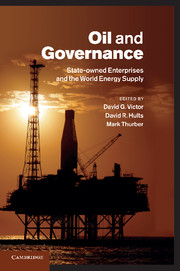Book contents
- Frontmatter
- Contents
- Figures
- Tables
- Boxes
- Contributors
- Acknowledgements
- Part I Introduction
- Part II Thematic studies of national oil companies
- 2 The political economy of expropriation and privatization in the oil sector
- 3 Hybrid governance: state management of national oil companies
- 4 On the state’s choice of oil company: risk management and the frontier of the petroleum industry
- Part III National oil company case studies
- Part IV Conclusions and implications
- Part V Appendices
- References
- Index
3 - Hybrid governance: state management of national oil companies
Published online by Cambridge University Press: 05 January 2012
- Frontmatter
- Contents
- Figures
- Tables
- Boxes
- Contributors
- Acknowledgements
- Part I Introduction
- Part II Thematic studies of national oil companies
- 2 The political economy of expropriation and privatization in the oil sector
- 3 Hybrid governance: state management of national oil companies
- 4 On the state’s choice of oil company: risk management and the frontier of the petroleum industry
- Part III National oil company case studies
- Part IV Conclusions and implications
- Part V Appendices
- References
- Index
Summary
Introduction
In this chapter, I analyze how states govern national oil companies (NOCs) – typically their chief sources of revenue and technocratic expertise. Some governance systems set clearly defined lines of authority, separating policymaker, regulator, and operator responsibilities, whereas others blur those lines almost completely. States differ in their control over NOC budgets, appointments, investments, and contracting arrangements with international oil companies (IOCs).
Despite these differences, a common thread exists: Most NOC governance systems are a hybrid of corporate governance, public administration, and regulation. Many NOCs’ founding laws and organizational by-laws mimic private sector corporate governance models. NOCs typically have a board of directors, hold annual shareholder meetings (with the state as the only or more important shareholder), and pay dividends. Many states also subject their NOCs to the same public administration tools that states use to control government agencies, like legislative budget approvals. And several states use regulatory powers to indirectly control their NOCs, with some also commandeering their NOCs as energy regulators. NOC governance reflects this hybrid blend because of the special challenges posed by managing oil companies. NOCs are almost invariably the leading state-owned enterprise (SOE) and often the largest domestic company, public or private, in the domestic economy. And unlike the perennial problem in many SOEs, which lose money, NOCs usually produce copious rents.
- Type
- Chapter
- Information
- Oil and GovernanceState-Owned Enterprises and the World Energy Supply, pp. 62 - 120Publisher: Cambridge University PressPrint publication year: 2011
- 3
- Cited by



